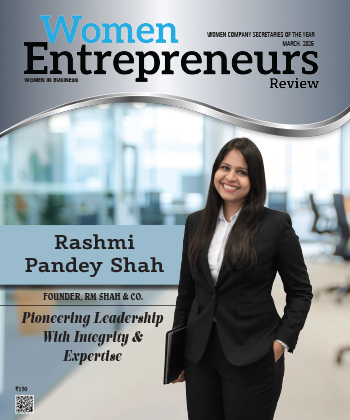
Women Steering the Next Era of Automotive R&D
By: Latha Chembrakalam, Head of Technical Center, Continental Automotive India
Latha is a dynamic business leader with nearly 30 years of experience in automotive technology. She oversees global engineering competence, focusing on autonomous mobility, safety, electrification, and AI. With expertise in team building and innovation, she drives growth and R&D excellence across multinational companies.
In a thought-provoking interaction with Women Entrepreneurs Review Magazine, Latha shares her insights on the evolving role of women in autonomous mobility and automotive safety innovations, building diverse R&D teams, overcoming industry challenges, and women’s contributions to future trends like electrification and vehicle networking.
As a leader in automotive technology, how do you envision the role of women in driving the future of autonomous mobility and vehicle safety innovations?
Diversity of thought is critical for every business. Women provide different perspectives to research, design, and decision-making processes that improve automobile technology’s adaptability, safety, and user experience.
A couple of decades back, STEM courses had lesser female enrolment but gradually there has been a radical improvement. At present, the ratio of junior female engineers entering the workforce is nearly on par with their male counterparts in most companies. Moreover, in senior and mid-level positions, the presence of women professionals is steadily increasing. Women are taking up more impactful roles in automotive and R&D industries, defying the past where primarily men represented these industries.
From the consumer perspective also, women can influence the evolution of autonomous mobility and safety systems. A study says that women are very positive of driverless taxis, mothers with children anticipate the convenience of travel using automated vehicles and their concern of safety features are very high. OEMs and Tier 1s can leverage these results to understand women’s needs better and consider them in future designs and developments for vehicles. Women engineers can contribute a lot to bring to life these aspects.
Irrespective of the domain, women are able to bring unique perspectives, problem solving skills and creativity to the table that can lead to more innovative and inclusive solutions.
What unique challenges have you faced as a woman in a traditionally male-dominated field like automotive technology, and how have you overcome them?
Being born and raised in an environment where gender was not a barrier had a significant impact on my life and work. Despite coming from a conservative family, I have never experienced any gender-based discrimination. Being a leader, I give more weight to a person’s ideas, competencies, abilities, and attitude than to their gender. According to me, employees should be judged based on what they bring to the table and the amount of hard work they put in rather than their gender.
I started my career in the automotive field in the mid-nineties and at that time, there was gender disparity in the industry as it was heavily dominated by males. Despite this, I took this as an opportunity to establish myself and further my career. One interesting instance is when I went to Germany in the mid-90s, I was the only woman engineer on the floor and it was difficult for the people to comprehend that I was an engineer from India. Over time, I have gained good credibility because of my hard work, my views, and my opinions. And of course, times have changed, and we have good focus on diversity at workplace.
Over the past few decades, female enrolment in STEM courses has significantly increased, leading to a near-equal ratio of female engineers entering the workforce compared to their male counterparts. Women are also steadily rising in mid and senior-level positions, making meaningful contributions in industries like automotive and R&D, which were traditionally male-dominated.
With close to three decades of experience, what has been your key learning about building diverse technical teams that thrive in cutting-edge automotive R&D environments?
Being valued and empowered to contribute is very much necessary for a diverse technical team to thrive. While the automotive and R&D sectors have traditionally been male dominated, the growing emphasis on diversity and inclusion is driving change. My key learning has been that we need to have an inclusive culture. It is important to champion this culture from the top by modelling inclusive behaviours, ensuring fair representations in all functions and disciplines and promoting a culture of belongingness.
Innovating products in the automotive sector also needs very diverse thought process, therefore having this diversity in technical teams is a must. Even when we talk about the new technologies like AI which inherits bias from the humans who program it, it is clear that we need diversity to get optimal results.
In your experience, how can women leaders in technology foster a culture of innovation and inclusivity within highly technical and competitive sectors like automotive engineering?
The increased presence of women in technology leadership offers a fresh perspective on innovation and management. They can use their influence to promote and support diversity initiatives within their organizations
Creating an inclusive work environment means ensuring that diverse perspectives are not only welcomed but actively encouraged. When people are empowered to exchange ideas and work together across disciplines, innovation begins.
As leaders, women can drive this by promoting open communication, mentorship, and opportunities for skill development. Providing equal access to opportunities, growing a culture of mutual respect, and encouraging diverse leadership styles, help create a balanced and forward-thinking workplace. Women leaders as role models also help a lot.
At Continental, we strongly believe in the importance of diversity to create a thriving work environment, and we recognize that diverse perspectives are a crucial factor in our success. Our goal is to inspire and support women and girls to explore careers in engineering, as well as to improve the vocational skills of women within our organization, fostering their rapid advancement and reducing gender inequality.
As a leader overseeing AI, software, and process methods, what advice would you give to women aspiring to lead in tech-driven industries with global impacts?
It is important for women to stay determined and never limit themselves. This field demands dedication, hard work, and continuous learning but the opportunities are immense. I see that in the mobility industry women are exceling in every field - design, engineering, manufacturing, software, sales, supply chain.
The automotive industry has undergone a huge transformation in the last decade and is still constantly innovating which means that there is always an opportunity to learn new skills and contribute to groundbreaking advancements in areas like software development, autonomous mobility, connected mobility and AI. If they choose this path, they should give it their all, and their efforts will pay off. Being in this industry gives an opportunity to contribute to a sector that shapes the way we live and travel.
How do you see women contributing to the rapidly growing sector of automotive technologies, particularly in areas like electrification and vehicle networking, over the next decade?
As the automotive industry evolves rapidly and women take on key roles, they will continue to play a significant role in shaping key technologies such as electrification and vehicle networking. The expertise in software development, AI, and power electronics is driving advancements in vehicle connectivity, and intelligent transportation solutions. As vehicles become more software-defined, women in engineering and technology are at the forefront of designing smart, efficient, and safe mobility solutions.
We are witnessing increased automation in manufacturing and a shift from traditional mechanical systems to digital and electronic architectures. As women take up more courses and roles related to STEM, the opportunities in the sector are also expanding.
Moreover, taking proactive steps to address gender inequity in STEM should not be seen as a women’s issue but as an organizational imperative. Women are already being involved in the most important discussions and decision-making processes without bias. Companies must continue to ensure transparent and fair communication of opportunities, creating an inclusive environment where everyone can thrive.
At Continental, we recognize the value of diverse perspectives in driving technological breakthroughs. By fostering an inclusive and supportive work culture, we are committed to empowering women to lead the future of mobility.
Most Viewed
- 1 Women's Health Startup HerMD Closing Doors Amid Industry Challenges
- 2 5 Famous Women in Indian Armed Forces
- 3 Saudi Women No longer Require Male Permission for Clothing Choices, says Prince MbS
- 4 Kolkata Medtech Startup Innovodigm Raises Rs 5.5 Crore Seed Funding Led by IAN Group
- 5 Yamunanagar's Kashish Kalra Honoured after Securing 111th Rank in UPSC Civil Services Exam
- 6 Madurai Appoints Its First Woman Corporation Head
- 7 IAS Vijayalakshmi Bidari Appointed as the new Nagpur Divisional Commissioner
- 8 American Entrepreneur Lucy Guo Overtakes T Swift to become Youngest Female Billionaire
- 9 ICC Women's World Cup 2025 Trophy Showcased at Indore's Holkar Stadium
- 10 Aparna Saxena's Beauty Venture AntiNorm Launches in India
- 11 Vidya Nataraj Co-Founded BlueStone Jewellery & Lifestyle files IPO
- 12 5 Women Freedom Fighters of India
- 13 Dr. G Krishnapriya appointed as CEO for Trichy
- 14 M3M & Sirona Partner to Introduce Menstrual Hygiene Vending Machines in 15 Locations
- 15 Punjab Govt launches SHE Cohort 3.0 Supporting Tech-led Women Startups
- 16 Indian origin Lawyer, Sweena Pannu appointed as the US New Superior Court Judge
- 17 The Aurora Tech Award recognizes 4 Indian Women-led Startups
- 18 Kerala's Republic Day parade featured an all-female tableau
- 19 Manisha Kabbur Becomes Karnataka's First Woman International Karate Coach
- 20 Director K. S. Ravikumar's Daughter Maalica Ravikumar Launches Life Coaching Company 'Evergrowth Academy' for Women
- 21 Leezu's Raises Pre-Seed Funding to Accelerate Growth in Sexual Wellness Industry
- 22 Sattu: Super-easy summer drink for PCOS gut healing
- 23 Swathi Nelabhatla creates Sitha App, India's First Women-Exclusive Gig Platform
- 24 7 Timeless Female Kathak Dancers & their Iconic Legacies
- 25 Meet 7 Iconic Women Architects of Modern India & their Most Impactful Work
- 26 This Woman-led Insuretech Startup is Helping Bridge the Education Financing Gap in India
- 27 Women Leaders Share Lessons Learnt from India Women's WC Win
- 28 5 Enterprising Women Founders Powering Singapore's Tech & Innovation Landscape
- 29 4 Women. 4 Stories. One Vision for Smarter, Stronger Healthcare
- 30 Global Gender Gap Narrows to 68.8%, But Full Equality 123 Years Away: WEF Report 2025
- 31 Changemakers: 7 Women Entrepreneurs Taking the Make in India Movement Forward
- 32 Meet Lucy Guo, The Youngest Self-Made Female Billionaire Disrupting Tech
- 33 How Women are Driving India's Festive Online Shopping Surge






